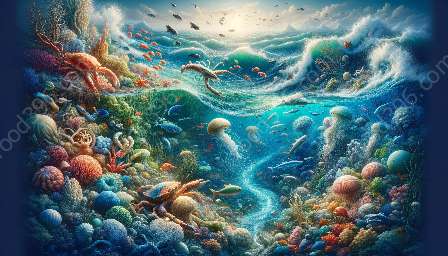Climate change and ocean acidification are intimately connected and have wide-ranging effects on oceanography, ecology, seafood production, and the overall health of our oceans. In this detailed topic cluster, we'll delve into the complex relationships between these phenomena and their impact on the world's oceans and seafood science.
Understanding Climate Change and Ocean Acidification
Climate change is the long-term alteration in Earth’s climate and weather patterns, often attributed to an increase in greenhouse gases in the atmosphere due to human activities such as burning fossil fuels and deforestation. Ocean acidification, on the other hand, refers to the ongoing decrease in the pH of the Earth's oceans, caused by the uptake of carbon dioxide from the atmosphere.
Impact on Oceanography
These changes in the environment have significant repercussions for oceanography, affecting temperature patterns, currents, and sea levels. For example, the increase in sea surface temperature can lead to coral bleaching and the disruption of marine ecosystems. Furthermore, changing ocean chemistry as a result of acidification can influence the distribution and behavior of marine species, impacting the overall biodiversity of the oceans.
Ecological Consequences
Unsurprisingly, these shifts in the physical and chemical properties of the ocean have widespread ecological consequences. Ocean acidification affects the carbonate chemistry in seawater, which can hinder the ability of shell-forming organisms such as mollusks and corals to grow and thrive. This, in turn, has far-reaching effects on the food web and the overall health of marine ecosystems.
Implications for Seafood Production
Given the intricate relationships between climate change, ocean acidification, and ocean ecology, it is crucial to consider the impacts on seafood production. Changes in ocean temperature and chemistry can directly affect the availability and quality of seafood resources. Additionally, alterations in the distribution and abundance of various species can have economic repercussions for fishing industries and coastal communities.
Seafood Science and Sustainability
Seafood science plays a vital role in understanding and mitigating the impacts of climate change and ocean acidification on seafood production. Researchers and scientists in this field are involved in studying the physiological responses of marine organisms to environmental stressors, as well as developing sustainable aquaculture practices to help alleviate the pressures on wild seafood populations.
Adaptation and Resilience
Through innovative research, seafood science aims to promote adaptation and resilience in the face of changing ocean conditions. This includes exploring new techniques for cultivating seafood in aquaculture systems with minimized environmental impact, as well as developing strategies to safeguard the genetic diversity of key commercial species.
Collaborative Efforts
Furthermore, collaborative efforts between oceanographers, ecologists, and seafood scientists are essential for devising holistic approaches to address the challenges posed by climate change and ocean acidification. By working together, these experts can advance our understanding of the interconnected systems at play and develop comprehensive solutions for sustainable seafood production.
The Future of Our Oceans and Seafood
As the impacts of climate change and ocean acidification continue to unfold, it is crucial to prioritize the conservation and responsible management of our oceans and seafood resources. This entails implementing evidence-based policies, supporting ongoing research initiatives, and fostering public awareness of the interconnectedness between these critical environmental issues.
In conclusion, the intricate web of interactions between climate change, ocean acidification, oceanography, ecology, and seafood science underscores the urgency of addressing these challenges collectively. By gaining a deeper understanding of these interrelated processes, we can work towards safeguarding the health and sustainability of our oceans and the future of seafood production.

